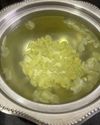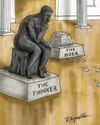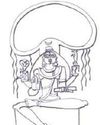
We often forget that the word cash is derived from the Sanskrit word “Karshapana”. Indians invented the idea of money long ago. Irregularly-shaped copper coins were used by merchants for banking 2500 years ago, about the time coins began being used in ancient Greece and China. Even before this, Harappans are known to have used Cowrie shells as currency for exchange. Across India, we find women from tribal communities still wearing Cowrie shells or coins around their neck. The ornaments indicate their use as currencies of exchange for a long time in the past. As late as the 14th century, Cowries were used as tools of exchange. Their use stopped when the Portuguese destroyed the market by flooding it with vast amounts of Cowrie shells obtained from the Maldives.
It has long been assumed that humans invented money to make the barter system easier as it became a common denominator of value. This sounds very logical. However, cultural anthropologists have not found any evidence of this in any part of the world. They found that tribal societies around the world were very comfortable with barter. It created a complex system of debt creation and giftgiving across cultures. In India, this took the form of the Karma theory that forms the bedrock of Jain, Buddhist and Hindu beliefs since the time coins appeared in the Indian subcontinent i.e., 5th century BCE.
This story is from the July 2023 edition of Yoga and Total Health.
Start your 7-day Magzter GOLD free trial to access thousands of curated premium stories, and 9,000+ magazines and newspapers.
Already a subscriber ? Sign In
This story is from the July 2023 edition of Yoga and Total Health.
Start your 7-day Magzter GOLD free trial to access thousands of curated premium stories, and 9,000+ magazines and newspapers.
Already a subscriber? Sign In

Moringa Flowers
Edible flowers? Yes! Ayurveda mentions many edible flowers. One of them is the Moringa flower.

You Gain Some, You Lose Some
Recently, we the Chennaites, got the opportunity to get blessings from His Sharada Peetam.

A Healthy Body
An incident from Swami Vivekananda's Life

A Man Himself is Responsible for His Deeds
Renouncing doer-ship

The Unstructured Drama of Life
Go for the silent roles

Positive Thinking and Meditation
A life-raft for seniors

Soul Connects
The Yoga Institute’s Reach Out Camp

The Wood Wide Web
As a kid, Suzanne Simard grew up in the rainforests of British Columbia and she normally spent her summers visiting forests around and exploring them along with her family, which included a curious dog named Jiggs.

More About Dharma and Duty
Considering One's Own Background (Part 2)

Devaluing Your Value
The lure of more